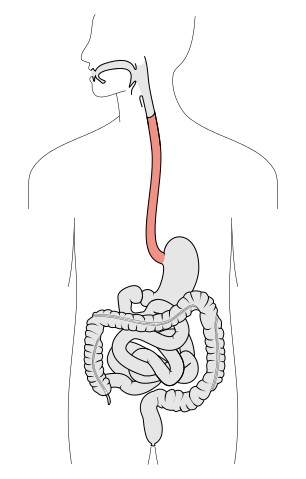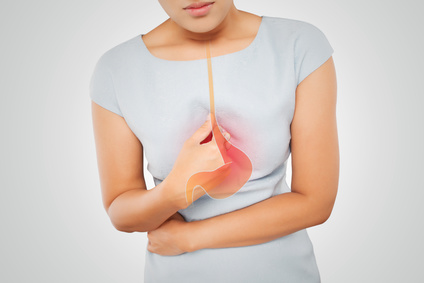Esophagitis (Inflamed Esophagus) Types, Causes, Symptoms
What is Esophagitis?
Esophagitis (UK ~ oesophagitis) is the medical term for inflammation of the esophagus, the long muscular tube of the gut which leads from the throat to the stomach. Esophagitis is a broad term to describe swelling of the esophagus, irritation of the mucosal lining or even lacerations of the esophageal wall. This may be a result of chemical irritation, medication, infections, trauma from retching or vomiting, temperature, radiation or autoimmune conditions.
There are various types of esophagitis named according to the cause. Prolonged exposure or continuation of the causative factor may lead from inflammation to hemorrhage, perforation and/or necrosis of the esophageal lining and wall. This can affect the stretching ability of the esophageal wall, mucus production of the esophageal lining and peristaltic activity responsible for esophageal motility and the lower esophageal sphincter (LES).

As the condition progresses, the inflammation may lead to fibrosis and stricture formation. This causes narrowing of the esophagus and impairs the movement of food through the esophagus. Depending on the nature of the causative factor and structural changes as a result of esophageal tissue damage, esophagitis may lead to esophageal cancer.
Symptoms of Esophagitis
Depending on the nature an severity of the esophageal inflammation, some or all of the following symptoms may be present.
- Nausea
- Vomiting, possibly even bloody vomit (hematemesis)
- Gastrointestinal chest pain – burning (heartburn), aching, sharp pain similar to cardiac chest pain
- Difficulty swallowing (dysphagia)
- Painful swallowing (odynophagia)
- Lack of appetite
- Unintentional weight loss
Types and Causes
Esophagitis is the inflammation of the esophageal lining and/or wall. The are various types of esophagitis classified according to the causative factor(s) which may also be an extension of the different types of gastritis.
Reflux Esophagitis
This is the most common type of esophagitis associated with gastroesophageal reflux disease. The backflow of the stomach contents damages the lining of the esophagus often leading to ulcer formation.

Although the esophageal lining contains mucus secreting glands which protects the esophagus against gastric acid, repeated episodes and persistent reflux will lead to mucosal injury. The lower esophageal sphincter(LES) prevents the backflow of gastric contents but when malfunctioning, the gastric acid can easily enter the esophagus and sometimes rise as high up as the throat.
Factors that contribute to decreased tone of the LES includes :
- Alcohol
- Cigarette smoking
- Drugs
- Hiatal hernia
- Obesity
- Pregnancy
- Various causes of delayed gastric emptying
Drug-Induced Esophagitis
Also known as pill-induced or medication esophagitis, the inflammation is caused by drugs which are temporarily lodged in the esophagus. This may be seen in cases of esophageal strictures, where the narrowing slows or temporarily halts the transit of substances down the esophagus. By partially dissolving within the esophagus over a period of time, these drugs may inflame and ulcerate the esophagus.
The strictures may be a result of fibrosis related to other types of esophagitis, esophageal cancer or benign tumors.
The most likely drugs to cause this level of esophageal irritation includes :
- NSAID’s including aspirin
- Alendronate (for osteoporosis)
- Antibiotics like doxycycline or tetracycline
Erosive Esophagitis
This type of esophagitis includes reflux and drug-induced esophagitis. It is sometimes broadly classified under chemical esophagitis. In addition, corrosive substances which are ingested either intentionally or accidentally may cause inflammation of the esophagus and ulceration of the lining. Substances that may cause chemical esophagitis, apart from gastric acid and drugs, includes :
- Strong alkalines (lyes)
- Strong acids
- Detergents
- Pesticides
- Mechanical lubricants and industrial additives
Eosinophilic Esophagitis
This occurs as a result of the infiltration of high quantities of immune cells which are responsible for inflammation into the wall of the esophagus. It is believed to stem from an immune-mediate hypersensitivity (allergy) as it is often seen in patients with the triad of allergic conditions – atopic dermatitis, allergic rhinitis and asthma. This type of esophagitis may be aggravated by dietary factors, particularly allergenic foods like cow’s milk.
Infectious Esophagitis
This type of esophagus arises as a result of an infection of the esophagus, spread from neighboring sites (mouth, throat or stomach) or systemic infections. This is more often seen with viral and fungal infections.
Some of the more common causes include :
- Viruses
- Herpes simplex
- Cytomegalovirus (CMV)
- Fungi
- Candida species (esophageal candidiasis)
- Rare – mucomycosis, aspergillosis
- Bacteria
- Non-pathogenic oral bacteria – secondary infection of an esophageal ulcer
- Pathogenic bacteria like Mycobacteriium tuberculosis and Mycobacterium avium-intracellulare
- Parasites
- Trypanosoma cruzi – Chagas disease
HIV testing is always worth considering in a case of infectious esophagitis as many of these infections are opportunistic. Chronic granulomatous disease may be another contributing factor to the development of recurrent infectious esophagitis.
Other Causes of Esophagitis
- Radiation esophagitis
- This type of esophagitis arises as a side effect of radiation therapy and is often associated with mucositis (inflammation of the mouth, gums and throat).
- Esophagitis related to inflammatory bowel disease
- This is rare but may be linked to Crohn’s disease.
- Esophagitis due to desquamative skin diseases
- Another rare cause of esophagitis when conditions like bullous pemphigoid, epidermolysis bullosa,lichen planus and leukoplakia involves the esophagus.
- Esophagitis due to inhaled toxins
- This may be due to lifestyle factors as seen with cigarette smoking or gases associated with environmental pollution.
References
- Esophagitis. Medscape



